Patients Trusting AI in MedSpas in the United States
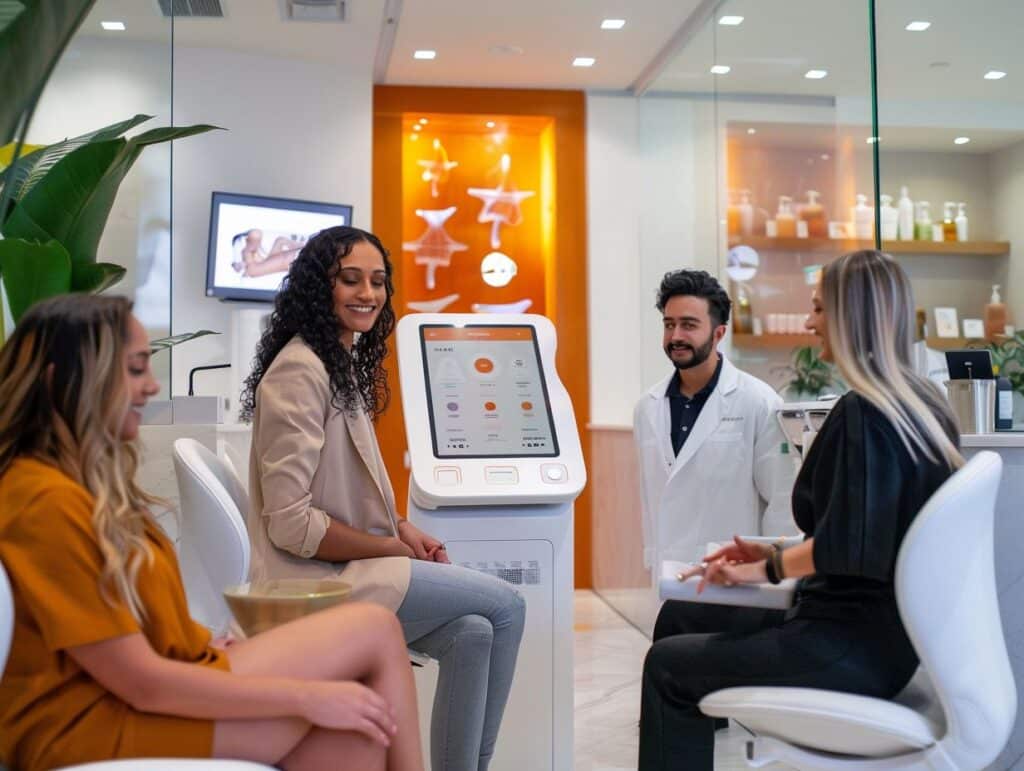
As the landscape of aesthetic medicine evolves, MedSpas are increasingly integrating technology to enhance patient experiences.
This article explores the transformative role of generated images in MedSpas, examining their importance in building trust, personalization, and visual appeal.
We will also address patient perceptions—do they trust these enhanced visuals, and are they more inclined to choose MedSpas that use them?
What Are MedSpas and AI?
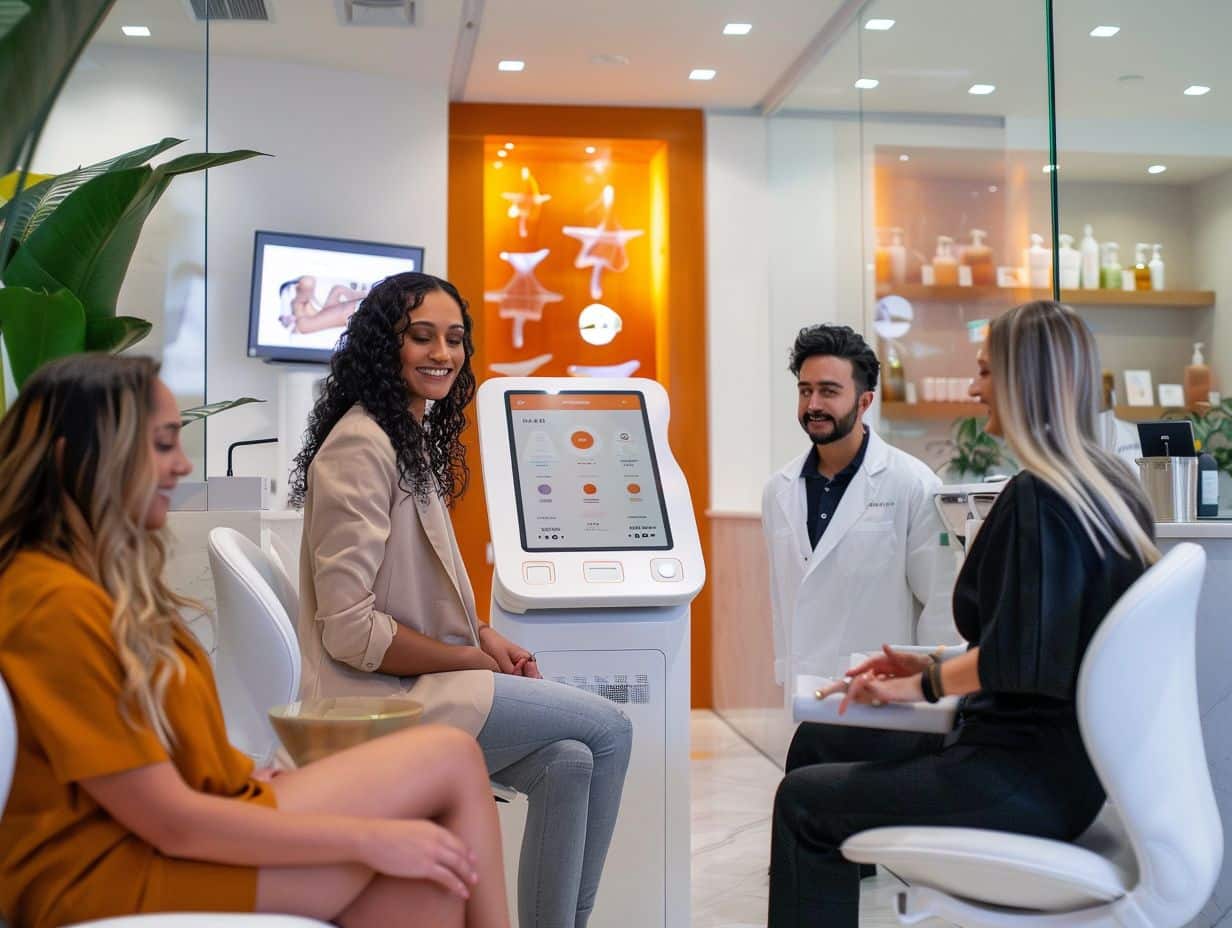
Medical spas, often referred to as med spas, are hybrid healthcare facilities that combine medical treatments with the relaxing environment of a day spa. They provide a range of cosmetic procedures, including skin analysis and rejuvenation therapies, facilitated by qualified healthcare providers like doctors and licensed practitioners. The integration of artificial intelligence (AI) into med spas represents a significant advancement in patient engagement, enabling clinics to enhance customer experience and streamline the consultation process while ensuring better patient outcomes and retention.
What Is the Role of AI in MedSpas?
AI plays a pivotal role in medical spas by automating various processes and enhancing the quality of patient outcomes through advanced technology and skin diagnostic tools, such as AI Skin Diagnostic systems.
It enables practitioners to harness predictive modeling for creating personalized treatment plans tailored to individual skin types and conditions. This means that medical spas can analyze data, allowing for more targeted therapies that improve the overall effectiveness of treatments.
In addition, the incorporation of AI enhances communication between practitioners and patients. Chatbots and virtual assistants can provide timely responses to queries and reminders, ensuring a seamless experience throughout the patient journey. Enhanced telemedicine services also allow for efficient monitoring and follow-ups, which are essential in maintaining patient engagement and satisfaction.
The impact of AI on productivity in these settings is substantial as well. Automating scheduling, tracking patient histories, and even managing inventory can free up valuable time for staff members, allowing them to concentrate on delivering superior care. Ultimately, the result is a more efficient practice that not only retains patients but also attracts new ones through positive outcomes and enhanced experiences.
Why Are AI-Generated Images Important for MedSpas?
AI-generated images are transforming the landscape of medical spas by significantly enhancing the consumer experience and establishing patient trust through visually appealing and accurate representations of potential treatment outcomes. This innovation not only aids in patient engagement but also plays a critical role in digital marketing strategies, allowing clinics to showcase their services effectively.
How Do Patients Feel About AI-Generated Images in MedSpas?
Patients’ perceptions of AI-generated images in medical spas can significantly influence their decision-making process, shaping their trust and overall consumer experience during the consultation process. Understanding how patients feel about these advanced technologies is crucial for clinics looking to improve their engagement strategies and patient retention efforts.
Do Patients Trust AI-Generated Images?
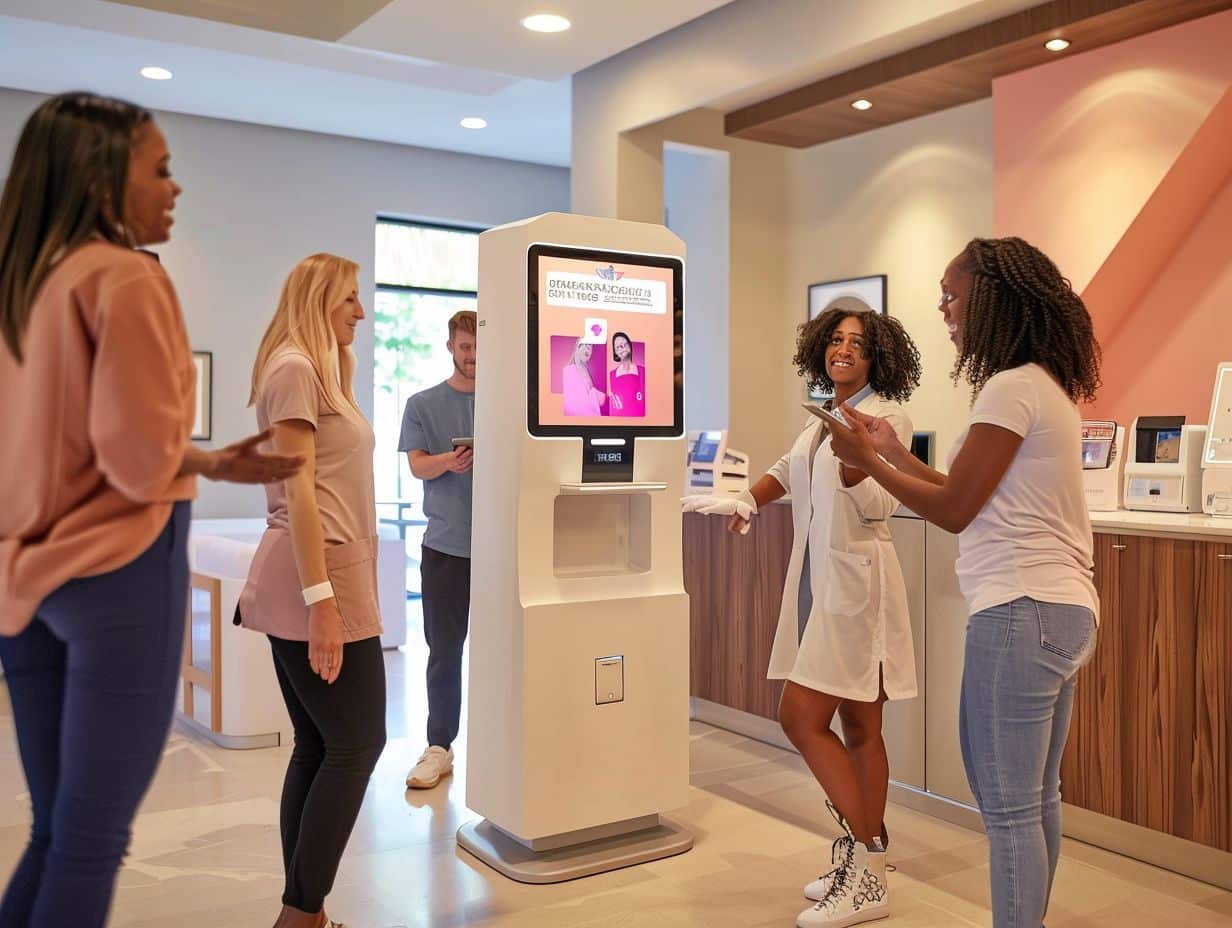
The trust that patients place in AI-generated images can significantly affect their decision to choose a medical spa; understanding this trust is crucial for healthcare providers looking to leverage technology effectively in their practices.
Research shows that when patients perceive AI-generated images as reliable, they are more likely to engage with the services offered by medical spas. Various factors contribute to this trust, including the clarity of the information provided, the quality of the imaging technology, and the perceived competence of the healthcare professionals involved.
In a recent survey, a staggering 72% of participants expressed that transparent communication regarding the usage of AI tools in diagnostics bolstered their confidence in treatment options.
- Factors impacting trust:
- Quality of image presentation
- Background of AI systems
- Testimonials from other clients
For clinics aiming to foster this trust, establishing an open dialogue with patients about the implications and advantages of AI integration is essential. This approach not only enhances patient satisfaction but also paves the way for better health outcomes.
Are Patients More Likely to Visit a MedSpa with AI-Generated Images?
Patients are increasingly drawn to medical spas that utilize AI-generated images, as these visuals not only enhance their overall customer experience but also facilitate better engagement during the decision-making process.
This trend reflects a growing awareness among potential clients regarding the benefits of advanced technology in the beauty and wellness industry. Research indicates that when medical spas incorporate AI-generated visuals, it significantly elevates patients’ trust and satisfaction. These images provide realistic previews of potential outcomes, thus assisting patients in visualizing their desired enhancements before committing to procedures.
The incorporation of such cutting-edge technology not only appeals to the aesthetic desires of new clients but also serves as a powerful marketing tool. Medical spas that showcase these AI creations through various platforms, including social media and online advertising, often experience:
- Increased lead generation
- Higher conversion rates
- Enhanced brand visibility
Consequently, it’s easy to see how utilizing AI-generated images has shifted consumer behavior, making it a strategic focus for businesses aiming to stay competitive in the medical spa sector.
What Are the Benefits of Using AI-Generated Images in MedSpas?
The integration of AI-generated images in medical spas offers numerous benefits, including increased patient trust, personalized care experiences, and cost-effective solutions that enhance productivity and operational efficiency.
Increased Trust and Credibility
AI-generated images can significantly increase patient trust and credibility for medical spas, as they provide realistic expectations of treatment outcomes and bolster the consultation process.
These digital representations help patients visualize their possible transformations, making them feel more confident in the decisions they are about to make. For instance, before undergoing treatments like dermal fillers or laser hair removal, many individuals express anxiety about the results. With AI-generated images, they can see a lifelike simulation of their post-treatment appearance, alleviating concerns about unrealistic expectations.
- One patient shared, “Seeing the AI image of myself after treatment was a game-changer. It made me feel understood and excited for the results!”
- Another noted, “I was hesitant at first, but the clarity and detail in the images helped me trust the process and the professionals at the med spa.”
By incorporating such technology into their services, medical spas not only enhance the perception of reliability but also elevate the overall quality of care provided, fostering a stronger, trust-based relationship with their clients.
Personalization and Customization
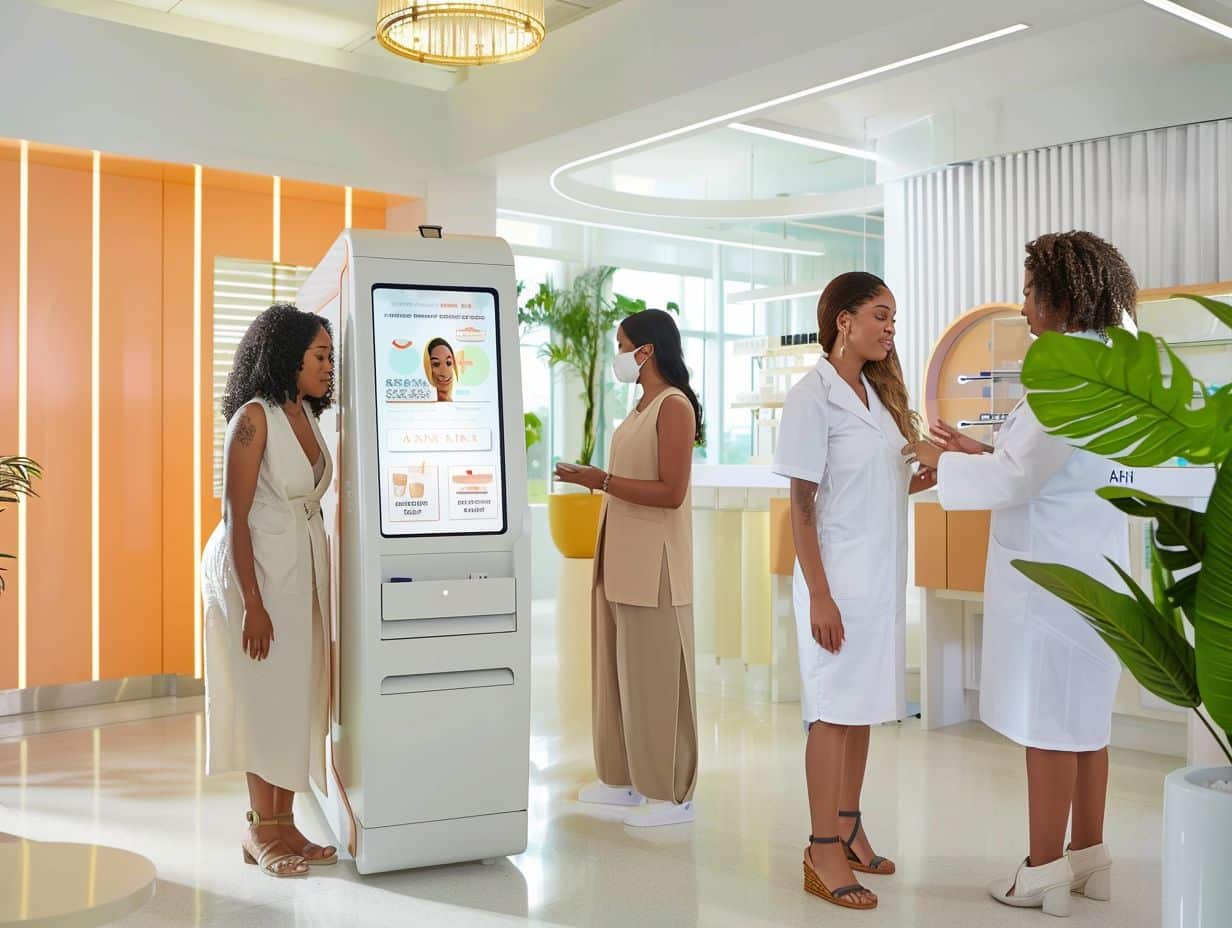
The use of AI-generated images allows medical spas to offer personalized and customized treatment plans based on individual patient needs and preferences, ultimately leading to improved patient outcomes.
By analyzing the unique characteristics of each client’s skin through advanced AI techniques, medical spas can create tailored visuals that illustrate potential results of various treatments. This approach not only enhances the consultation experience but also enables clients to make informed decisions regarding their skincare journeys.
- Patients feel more involved in the process, as these visuals can effectively communicate expected outcomes.
- This level of personalization helps address specific concerns, thus improving patient satisfaction.
- When clients perceive that their particular needs are being prioritized, they are more likely to return, fostering loyalty and encouraging them to refer others.
As a result, utilizing AI-driven skin analysis reinforces the trust between patients and providers, ultimately promoting long-term relationships.
Cost and Time Savings
AI-generated images contribute to significant cost and time savings in medical spas by streamlining the consultation process and reducing the need for multiple in-person clinical visits.
These innovative tools facilitate enhanced communication between practitioners and clients, ensuring that expectations align more accurately. By employing AI-generated imagery, med spas can offer personalized previews of treatments, allowing clients to visualize potential results. This approach not only fosters trust but also makes the decision-making process smoother.
- AI tools analyze client data to tailor services, ensuring optimal satisfaction.
- They help busy medical staff allocate their time more effectively, focusing on essential tasks rather than repetitive consultations.
- Operational costs are minimized as resources can be directed toward areas that require immediate attention.
As a result, the overall efficiency of the med spa experience significantly improves, providing higher quality care while also maintaining a healthy bottom line.
Enhanced Visual Appeal
The enhanced visual appeal provided by AI-generated images helps attract patients to medical spas, creating a compelling consumer experience that effectively communicates the benefits of various treatments.
In today’s fast-paced digital landscape, first impressions are everything. The visual element is paramount in shaping potential clients’ perceptions and decisions. By integrating dynamic and engaging visuals into their marketing strategies, med spas can significantly increase their online presence. A well-curated aesthetic not only draws attention but also fosters trust and credibility.
- High-quality images showcase the effectiveness of treatments.
- Visual storytelling enhances emotional engagement.
- Digital platforms thrive on shareable content, making aesthetics essential.
Thus, when promoting services such as facials, body contouring, or laser treatments, leveraging beautifully designed graphics becomes crucial. Effective visual marketing not only informs but also entices prospective patients into taking the next step towards enhancing their well-being.
What Are the Concerns and Risks of Using AI-Generated Images in MedSpas?
While AI-generated images offer numerous advantages for medical spas, they also present concerns and risks that must be carefully managed, including ethical considerations around representation and accuracy.
Potential for Inaccurate Representation
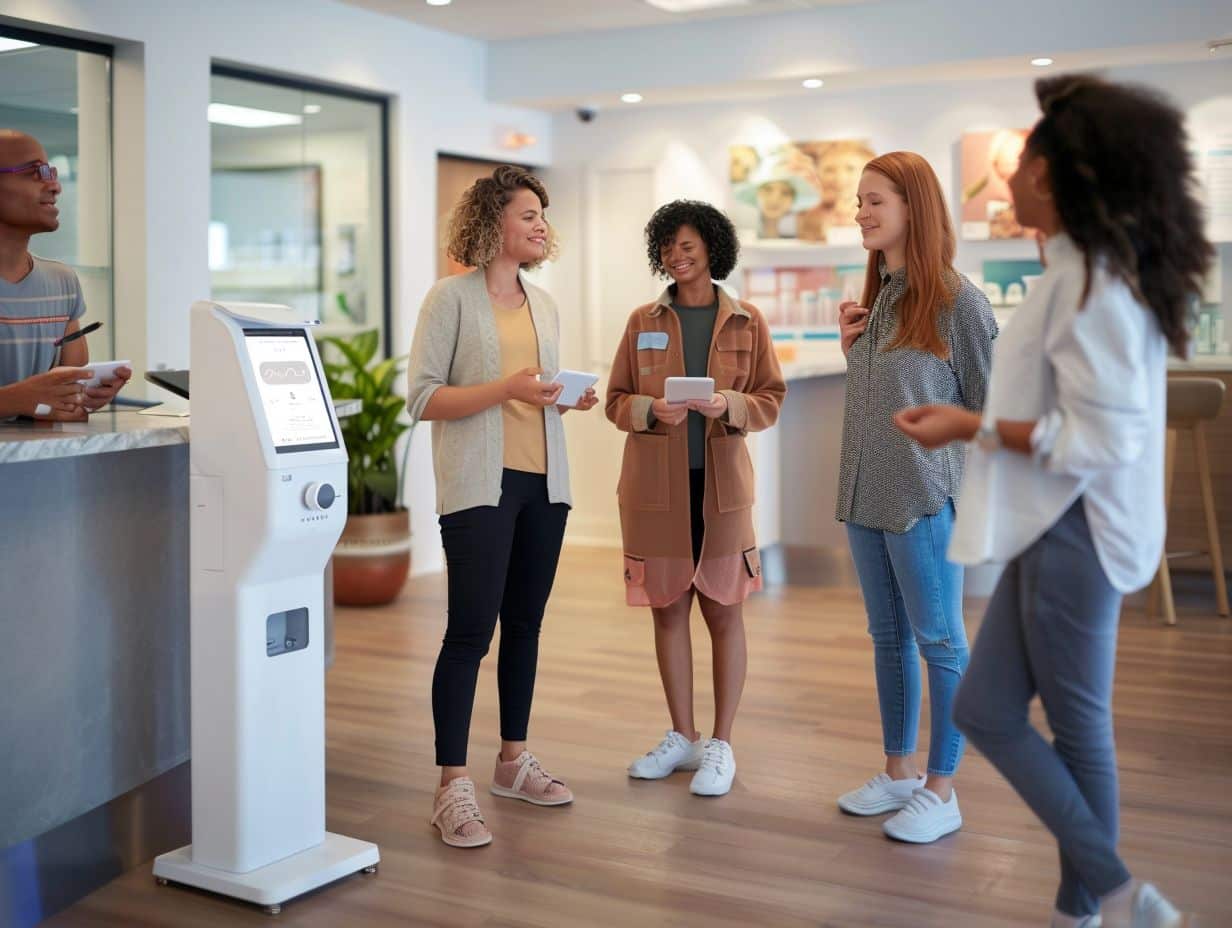
One of the significant concerns regarding AI-generated images is the potential for inaccurate representation, which can undermine patient trust and lead to unrealistic expectations about treatment outcomes from medical spas.
When clients view potential results that do not align with their actual experiences, it can result in disappointment and dissatisfaction. For example, if an AI-generated preview showcases a dramatic transformation that is not realistically achievable for the individual, the gap between expectation and reality widens. This misalignment could also affect the overall reputation of the med spa if clients share their experiences publicly.
To mitigate such risks, med spas can adopt several strategies:
- Enhancing Transparency: Clearly communicate the capabilities and limitations of the treatments.
- Providing Realistic Previews: Include actual before-and-after photos of previous patients to give prospective clients a more accurate idea of possible results.
- Encouraging Consultations: Facilitate thorough discussions between clients and practitioners to align expectations through personalized assessments.
By implementing these strategies, med spas can build a foundation of trust and ensure that the clients feel informed and valued.
Ethical Considerations
The ethical considerations surrounding the use of AI-generated images in medical spas revolve around ensuring that these visuals do not mislead patients or compromise their trust in the services provided.
As the popularity of medical spas continues to rise, understanding ethical challenges associated with the utilization of AI-generated images becomes increasingly essential. These establishments must navigate the fine line between attracting potential clients through enticing marketing tactics and providing an honest representation of the outcomes patients can genuinely expect.
If these images create unrealistic expectations, they not only endanger the credibility of the spa but also jeopardize patient satisfaction and loyalty.
- One way to address this challenge is by employing clear disclaimers that specify the visual enhancements made through digital means.
- Ethical marketing practices can include sharing real patient testimonials and before-and-after photos with appropriate consent.
The goal remains to foster a transparent relationship that prioritizes patient care above all, ensuring that technology serves to enhance, rather than distort, the understanding of available services.
Dependence on Technology
Another concern with the reliance on AI-generated images in medical spas is the potential overdependence on technology, which may overshadow the importance of personal interaction and traditional patient care.
In a world increasingly dominated by technology, the balance between digital tools and human touch becomes paramount. While AI and advanced analytics can enhance diagnostic accuracy and streamline workflows, overreliance on these systems poses significant risks.
Clinicians might inadvertently bypass essential, face-to-face dialogues that foster trust and understanding. It’s crucial for practitioners to remember that patient care is not solely about data points or graphical representations; rather, it relies heavily on empathy, individualized attention, and the nuances of human interaction.
- Patients may feel alienated if technology becomes the primary mode of communication.
- Critical nuances and emotional cues could be overlooked when tech takes precedence.
- Trust in healthcare can erode if patients perceive their care as purely algorithm-driven.
To mitigate these risks, a harmonious integration of technology with personalized care practices is essential, ensuring that the essence of healthcare remains focused on the individual.
How Can MedSpas Ensure Trust and Transparency with AI-Generated Images?
Ensuring trust and transparency when using AI-generated images in medical spas is essential for maintaining patient confidence and fostering long-term relationships, which can significantly impact patient retention and satisfaction.
Maintaining a Balance between AI and Authenticity
Finding a balance between leveraging AI technology and maintaining authenticity is crucial for medical spas to ensure a positive patient experience and uphold trust.
Utilizing AI tools for scheduling, follow-ups, and personalized recommendations allows clinics to operate efficiently and effectively; however, it is the human touch that truly makes a difference when it comes to patient satisfaction.
To achieve this balance, medical spas should:
- Emphasize real, face-to-face consultations where patients feel heard and valued.
- Incorporate AI-driven analyses to provide tailored treatment options only after understanding the patient’s individual needs.
- Train staff to use AI tools as assistants rather than replacements, ensuring that genuine interactions remain at the forefront.
By integrating authentic patient interactions alongside AI-generated tools, the overall patient experience can see marked improvements, fostering a sense of security and loyalty that meets and exceeds expectations.
Frequently Asked Questions
1. What is AI and how is it used in MedSpas in the United States?
AI, or artificial intelligence, is the simulation of human intelligence processes by computer systems. In MedSpas, AI is used to analyze and process large amounts of patient data, aiding in diagnosis and treatment planning.
2. How does AI-generated imaging benefit patients in MedSpas?
AI-generated imaging allows for more accurate and precise diagnosis and treatment planning, leading to improved outcomes for patients. It also reduces the risk of human error and can save time and costs for both patients and MedSpas.
3. Can patients trust AI-generated images in MedSpas?
Yes, patients can trust AI-generated images in MedSpas. These images are created using advanced algorithms and are constantly improving with new data, making them reliable and accurate for use in diagnosis and treatment planning.
4. Are AI-generated images in MedSpas safe for patients?
Yes, AI-generated images in MedSpas are safe for patients. These images are created using non-invasive methods and do not pose any harm to patients. They also comply with all medical regulations and standards.
5. How does AI affect the overall patient experience in MedSpas?
AI has the potential to greatly improve the overall patient experience in MedSpas. By providing faster and more accurate diagnosis and treatment planning, patients can receive more personalized and effective care, leading to a higher level of satisfaction.
6. Will AI eventually replace human practitioners in MedSpas?
AI is not meant to replace human practitioners in MedSpas. Instead, it is meant to enhance their capabilities and support decision-making processes. Human practitioners will always be essential in providing personalized care and understanding patient needs in MedSpas.
